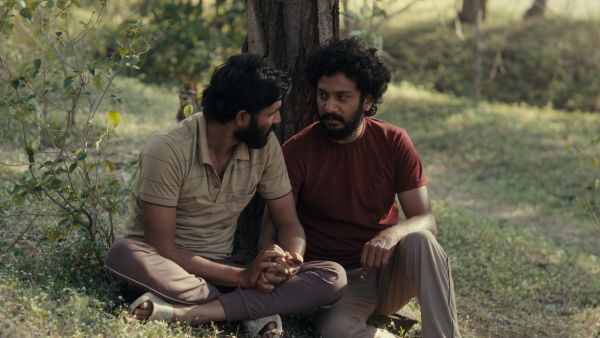
With spring comes the return of one of the coolest festivals in New York: New Directors/New Films, now celebrating its 54th edition and once again showcasing outstanding work by emerging filmmakers. The films presented here span various genres and come from directors across the globe. This international and diverse lineup is precisely what makes the festival exciting, as it offers fresh perspectives and introduces new voices often absent from mainstream theatrical releases or streaming services, especially at this time of year. Among the festival’s rich selection, three must-see highlights stand out, all still seeking distribution in the United States.
Queer longing and mourning rituals intertwine with symbolic and narrative richness in Cactus Pears, the feature debut of director Rohan Parashuram Kanawade. Raised in Mumbai, Kanawade draws from personal experiences to craft a tender and empathetic portrait of contemporary India. After years of living and working in the city, Anand (Bhushaan Manoj) returns to his childhood village following his father’s death. His visit isn’t just about saying goodbye and attending the funeral; as the only son, he is required to actively partake in a series of traditional rituals over 10 days (including walking barefoot at all times, not covering his head from the sun, and eating only at specific times of the day).
Anand had a close relationship with his father, who was aware of the most personal aspects of his son’s life—his gay identity, heartbreaks, loneliness, and the obvious reasons he never felt comfortable living where he couldn’t escape prejudice and external scrutiny. Returning home becomes an oppressive experience: Anand must act a certain way and dodge uncomfortable questions as family and acquaintances gather for the expected rituals. Older relatives keep insisting that it’s time for him to marry. His mother, however, has crafted a story: He has remained single due to heartbreak over a woman he loved who married someone else—a technically true story, except for a gender swap. Eventually, Anand finds solace in reconnecting with a childhood friend, Balya (Suraaj Suman), a landless farmworker and occasional driver who also faces constant pressure to justify his perpetual bachelorhood. His socioeconomic status might be an acceptable excuse, but his family still tries to arrange a marriage.
Furtive glances and near-touches between Anand and Balya betray an erotic tension but also a quiet joy filled with unspoken promises and hopes best left unvoiced. Whether there was ever a romantic history between them is left unsaid. They share a secret complicity, even though their lives couldn’t be more different. These men express affection and devotion through actions rather than words—whether it’s Balya collecting the cactus pears that give the film its title because they were Anand’s childhood favorite or Anand willingly accompanying Balya in his daily labor despite the harsh climate and its punishing effects (all while continuing to observe his required mourning rituals).
Cactus Pears delivers the anticipated moment of physical and spiritual connection, but to describe it solely as a gay romance would be reductive. A fundamental aspect of the story is Anand’s experience of grief and the contradictions between how he is expected to display it socially—as a kind of performance—and when he will find the right moment to privately mourn his loss. Another crucial element is his reconciliation with his surroundings and his own prejudices, shaped by his assumptions about what others expect from him. A conversation with his mother is both sweet and devastating, precisely because of the revelation that he is more loved and respected than he assumed. The script could have easily fallen into the usual tropes of cautionary tales about homophobia and religious fanaticism. Instead, its social and cultural observations allow glimmers of hope and optimism about the future. A beautiful, delicate, and sensual debut that introduces a filmmaker with a keen instinct for capturing the sublime through striking imagery and sharp dialogue.

From romantic subtleties, we move to the thrilling excesses of horror with The Virgin of the Quarry Lake, a Spanish-Argentine co-production and a potential international breakthrough for Argentine director Laura Casabé. This might be the most commercially viable entry at New Directors/New Films this year, given how well the horror genre tends to fare when word-of-mouth spreads about this unpredictable and substantial film that is much more than jump scares. Benjamin Naishtat faithfully adapted a couple of Mariana Enríquez’s short stories, which only adds to its appeal.
Set in early 2000s Argentina—a time of economic crisis and widespread despair—Natalia (Dolores Oliverio) navigates the weight of her seemingly minor teenage dramas, mirroring a country in a state of moral and social collapse. In her impoverished neighborhood, brutal accidents are a daily occurrence—whether it’s a drunken homeless man being beaten to death or a nosy neighbor getting run over by a speeding car. As a recent high school graduate, Natalia spends her summer with her two best friends, trying on discount-store clothes they can’t afford and visiting cyber cafés just so Natalia can chat with a lifelong crush.
Still yearning for Diego (Agustín Sosa), with whom she shared a flirtatious moment at a recent party, Natalia is determined to lose her virginity to him. What she doesn’t fully realize is that her formidable will is backed by her beauty and a mysterious inheritance that may be linked to dark forces: Whenever she is angry or upset, bad things tend to happen. She is similar to Stephen King’s Carrie, but the fiery prom queen version, envied rather than ridiculed. Any reciprocated interest from Diego, though, is thwarted by the presence of Silvia (Fernanda Echevarría), a woman nearing her 40s who clings to youth by hanging out with teenagers. Natalia’s jealousy helps her see Silvia as a rival but also motivates her to look past the mature woman’s boastful anecdotes. These same jealous impulses also feed a latent darkness in Natalia—one that perhaps only her grandmother, a classic neighborhood witch, recognizes as something to be feared.
The girl’s summer, her quarry lake escapades with friends, and the presence of Silvia take an increasingly menacing turn. Without spoiling its secrets and twists, this is the kind of horror film that isn’t just about scaring the audience—it creates an immersive atmosphere that is as seductive as it is unsettling, thanks to its unflinching bursts of violence, a gradual descent into supernatural dread, and a mesmerizing central performance. While there’s plenty of blood spilled, perhaps the most chilling moment is a macabre prayer ending in an unforgettable whisper.
Meanwhile, the presence of the INCAA logo at the film’s start—representing Argentina’s recently defunded national film institute—leaves a bittersweet aftertaste, reminding us of the current government’s attempts to dismantle state support for the arts and culture. The prospect of future projects like this being left without resources is disheartening, especially at a time when Argentine cinema is experiencing a remarkable creative peak. Casabé’s work should be a source of inspiration for what can follow rather than a closing chapter.

As an example of how, even amid the worst crises and circumstances, great art can still thrive, the documentary The Lost Chapters by Venezuelan filmmaker Lorena Alvarado emerges as a small yet miraculous oasis of beauty within Venezuela’s struggling film industry. Though entirely filmed in Caracas—an incredibly photogenic city—its production methods (funded internationally and detached from any local government support) align more closely with the cinema of the diaspora: the wave of filmmaking led by Venezuelan directors who have migrated abroad and engage with their complex heritage and contemporary history from afar (Simón, Upon Entry are recent examples). Alvarado’s contribution is perhaps the richest and most compelling example of this trend so far, particularly because it directly confronts the phantasmagoria of a country left behind after so many departures.
As another Venezuelan emigrant, now writing about images of a country I haven’t seen in almost a decade, watching The Lost Chapters is a bittersweet experience. Its greatest strength lies in understanding that the hows and whys of our departures don’t need to be shown. We know them too well. Instead, Alvarado focuses on a reunion that feels more like a resigned farewell than a reconciliation. Ena (Alvarado) returns to Caracas for a few weeks to, among other things, unravel the mystery of a book by the Venezuelan author Rafael Bolívar Coronado—a picaresque figure from the early 20th century who wrote numerous texts under various pseudonyms and in different countries.
This visit also allows her to reconnect with her grandmother, Mamama, who is showing early signs of dementia, and her father, Ignacio—once the emblematic owner of one of Caracas’s most well-known intellectual bookstores. (I bought books from his store, I must say.) Due to what locals simply call la situación país—a catch-all euphemism for so much horror and loss—his bookstore now exists only as a private storage space, a Borges–like Library of Babel that keeps growing despite the absence of readers or buyers. Ignacio pursues daily quests: collecting books, accepting donations, and visiting the libraries of old friends who have permitted him to “loot” them since they no longer live there.
These three real-life figures—drawn in a way that makes them feel like characters in a uniquely quiet and cultivated fiction—are all Alvarado needs to present a side of Venezuela that is more necessary than ever. Watching a granddaughter help her grandmother recite the poem she once taught her as a child, or witnessing a stroll through the grand architecture of the Central University of Venezuela and the National Library, evokes something Venezuelan cinema has not dared to explore in a long time—the country’s rich intellectual heritage. The Lost Chapters is a round-trip journey to a ghost town, where the protagonist discovers that nothing has changed—and what a relief! And what a sorrow! that realization brings.
















Leave A Comment